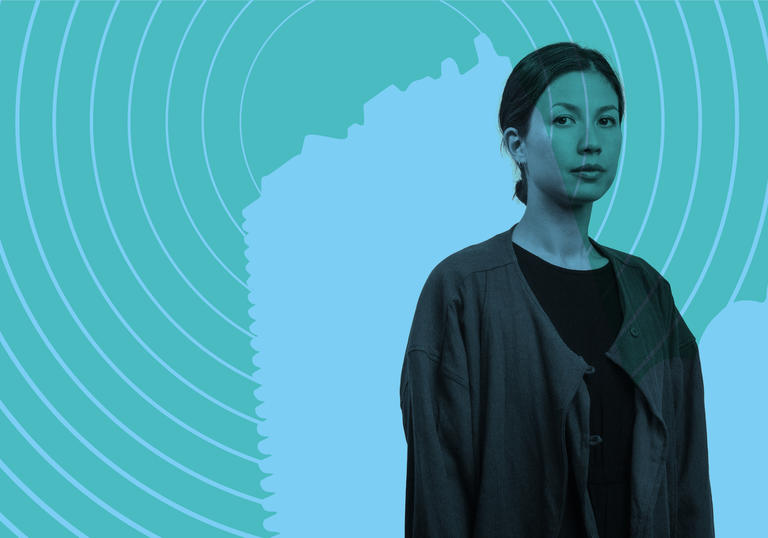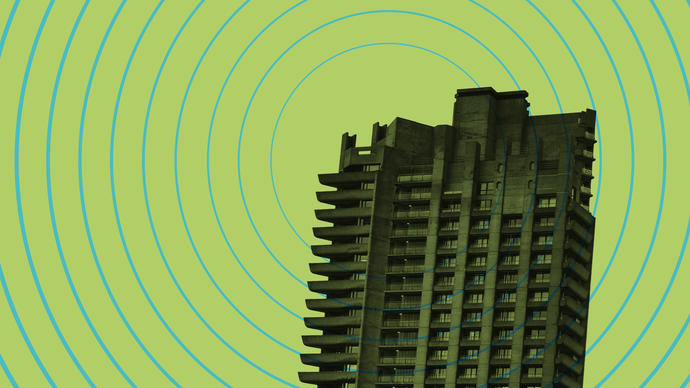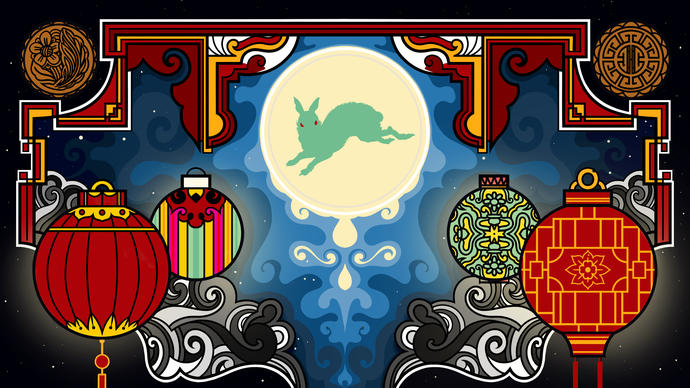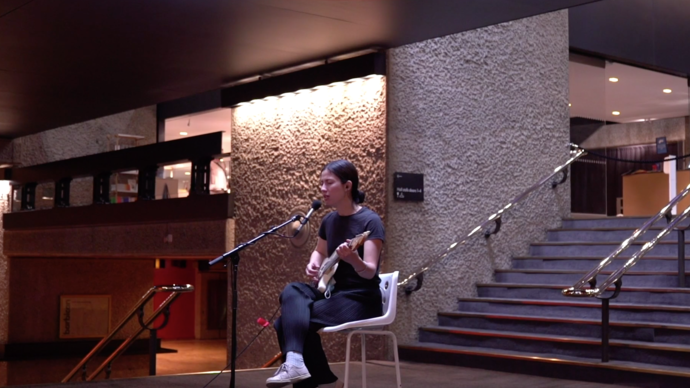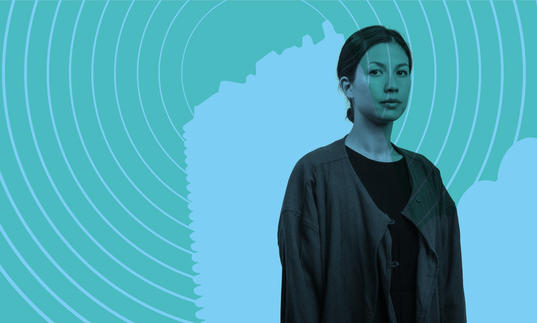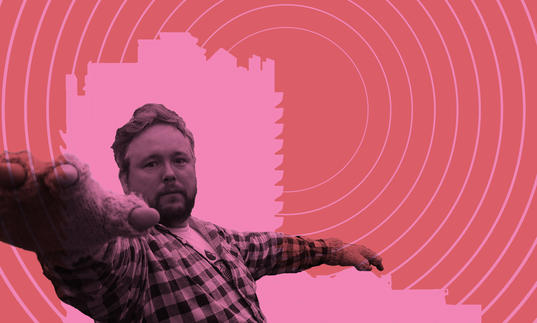It took three decades, spent living across as many continents, for Emma-Lee Moss – or Emmy the Great, as she is better known – to direct her songwriting imagination towards her mixed Chinese-English heritage. Gathered in her fourth studio album, April / 月音, the resulting songs tell, with a new repertoire of sonic textures and an almost mythic expansiveness, the story of her return, for the first time since childhood, to live in the Hong Kong of her birth. And yet, she later realised, Hong Kong had always been there – a shadow-city underlying the London, New York, and LA that formed the backdrop to her previous records. ‘Hong Kong is my subconscious. Because I left, it’s the landscape of my dreams… It’s always in everything I write.’
Moss recounts how, in her mid-30s, she set herself the task of pursuing two, impossible to separate questions, ‘the idea of what home is’ and ‘who I am’. Her earlier records delved into what connects us as people, from the youthful romantic encounters of First Love (2009), to the surprise breakdown of an engagement in Virtue (2011), to the atomisation or altered forms of intimacy promised by technology in Second Love (2016). April / 月音, however, feels more like a pilgrimage.
A vivid sense of place emerges in many of the tracks, or rather a sense of movement between places: ‘Come on, let’s be dandelions / Scatter all over the place.’ No less evocative is the decision to incorporate field recordings drawn from Hong Kong’s own soundscape – its rumbling underground MTR tracks and distinctive traffic lights that ‘snap like 808 claves’. Moss recalls the excitement in experimentation she and her band felt while recording in Brooklyn during February 2018, a spontaneity she will retranslate for her performance at the Barbican. ‘The record expands beyond the normal instruments. We tried to leave a lot of ambient textures from people coming to visit the studio, or slamming a door by mistake, or the sound of my friend’s baby.’
Together with the singing bowls, prayer bells, Buddhist drums, and other traditional instruments she picked up on her travels through Asia, which can be heard chime and fade hauntingly through various tracks, these ambient elements help take her evolution as an artist into new musical terrain. The result is a sound eclectic in its cultural influences, whose DNA can be traced now to an upbeat country strumming, now to the humid strains of Cantopop.
Still flashing through the songs is the same wit that has marked out her extraordinary powers as a lyricist from the start: ‘As I climb the 10,000 steps up to the temple/I begin to believe that the journey would be easier if I wasn’t so literal.’ Moving from emotional heft to endearing self-deflation and back again via their off-kilter rhymes, these lines from ‘Okinawa’ swell into something quite sublime: ‘Our parents dreamed of escape/Now all their dreams are ours.’ For Moss, her travels through China and Hong Kong were also a spiritual journey of ‘coming to terms with myself’ – the self in all its jostling and contradictory aspects – including her once dormant mother tongue, Cantonese.
Second Love included alternate versions of certain tracks sung in Chinese, but that impulse goes much further in April / 月音. It opens with a spoken word prologue entirely in Cantonese, where near-inaudible whispers and susurrations ripple through the background like intimations from the subconscious. It felt natural to scatter Cantonese through the record, Moss explains. ‘And those bits are the bits that are most private. The parts of the story that are utterly true and not fictionalised at all. Obviously, I was in a city where eight million people could speak Cantonese. But often in my life I’ve been the only person who could speak it.’
For Moss, beginning to write in autumn 2017 was a process of surrendering to ‘intuition’. Something half-understood, some turning season in her life, had called her back: ‘I felt like I should get to Hong Kong in time for the Mid-Autumn Festival.’ That festival’s tutelary deity is the moon goddess Chang’E, whose name just happens to resemble the English word ‘change’. Moss’s song in her honour, ‘Chang-E’, has a crystalline, otherworldly quality, layering distortion onto its echoing refrain – ‘When we achieve weightlessness’ – which seems to speak as much to Buddhist detachment as to moonwalking. ‘I became obsessed with Chang’E. The story that I knew as a kid was about defiance.’ In some versions, she disobeys her tyrant husband by drinking his elixir of immortality, before floating up to reside forever on the moon. ‘I see her as this person who finds herself… in this liminal, mythical space of the moon’.
The album’s Chinese title 月音 (Yuet Yam) literally translates as ‘moon music’ or ‘sounds from the moon.’ Moss’s season of moon music at the Barbican extends into a series of curated events around the theme of Mid-Autumn. Her Barbican live stream will be followed by a panel discussion, where Moss and fellow musician Bishi and writers Jessica Lee and Rowan Hisayo Buchanan will compare notes on the moon, its mythology, and the creative uses of intuition. She has also curated HK SOIREE, an evening that will bring together Hong Kong writers and artists to celebrate the city at this precipitous juncture in its political life – a group of people Moss feels can ‘support the thing that I love there, and help keep it going.’
‘Sometimes we can’t see what’s up ahead.’ So opens the album’s bonus track, ‘Green Grass’. April / 月音 was written during a window of calm between the Umbrella Movement of 2014 and the anti-Extradition Law protests that erupted in 2019. It is preoccupied with the future and our (in)ability either to divine or affect it. ‘Mary’, for example, is based on a gnomic real-life encounter with a traditional Hong Kong fortune teller. This note of anxiety seems to stretch beyond the personal to take in Hong Kong’s own uncertain future. Emmy the Great has finally come to explore her Cantonese identity at just the moment the city of her birth is frantically asserting its own.
